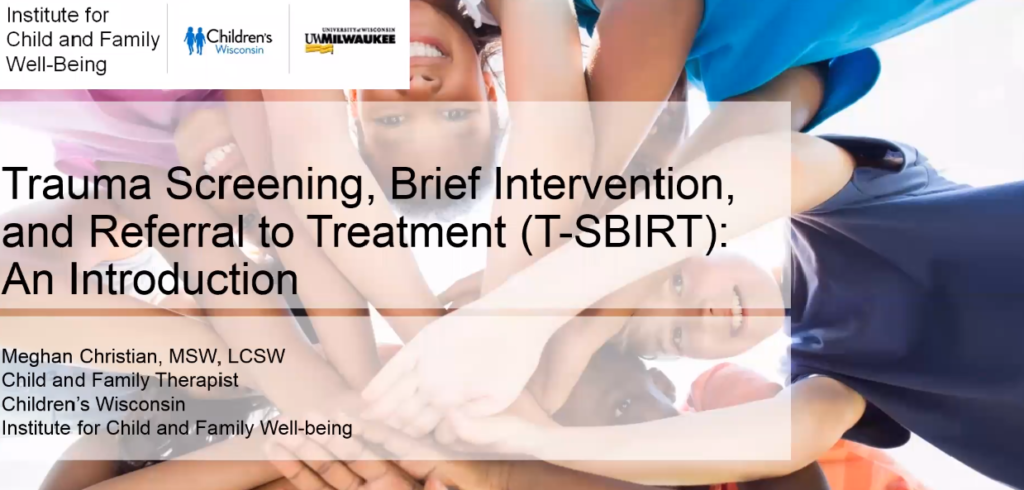 The Institute for Child and Family Well-Being was proud to host the webinar “Trauma screening, brief intervention and referral to treatment (T-SBIRT): Introduction to a promising, brief protocol for social service and healthcare settings.” Led by Dr. Dimitri Topitzes, Clinical Director of the Institute for Child and Family Well-Being, and Lisa Ortiz, UMOS, the webinar took place on June 17th at 11:00 CST.
The Institute for Child and Family Well-Being was proud to host the webinar “Trauma screening, brief intervention and referral to treatment (T-SBIRT): Introduction to a promising, brief protocol for social service and healthcare settings.” Led by Dr. Dimitri Topitzes, Clinical Director of the Institute for Child and Family Well-Being, and Lisa Ortiz, UMOS, the webinar took place on June 17th at 11:00 CST.
This webinar introduced participants to a discrete trauma responsive protocol – trauma screening, brief intervention and referral to treatment or T-SBIRT – which has been implemented in various healthcare and social services settings in southeastern Wisconsin. Integrating T-SBIRT within such programs recognizes two interrelated truths: 1) most people experience significant adversity and trauma across the life course, an assertion that is all-the-more salient during this time of pandemic, stay-at-home orders, and collective trauma, and 2) frequent exposure to adversity and trauma undermines functioning across myriad domains including physical, mental, and behavioral health.
Delivered by psychotherapists, case managers, nurses, or other professional service providers, T-SBIRT helps programs address the effects of trauma exposure among clients or patients. More often than not, trauma is at the root of client and patient presenting problems. The protocol therefore contributes to effective and efficient trauma-responsive care and overall service delivery.
During the webinar, we described the T-SBIRT protocol, which is based on SBIRT for substance misuse and requires anywhere from 10 to 30 minutes to complete. In addition, we reviewed results from several studies that we recently published, indicating that it is feasible to implement T-SBIRT within healthcare and social service programs and that T-SBIRT may be associated with improved mental health and employment outcomes.
Dr. Topitzes, designed and tests T-SBIRT, and Lisa Ortiz is a supervisor who oversees implementation of T-SBIRT in her TANF program. While Dr. Topitzes provided details about the protocol and feasibility studies, Ms. Ortiz discussed her experience with T-SBIRT, highlighting obstacles to implementation along with perceived staff and client benefits.
Listen to the recorded webinar here.
Related Resources from the ICFW:
T-SBIRT Protocol (English version)
T-SBIRT Protocol (Spanish version)
Fact Sheet: Understanding and Responding to Trauma
Issue Brief: Trauma Screening, Brief Intervention, Referral to Treatment (T-SBIRT)
Issue Brief: Asking Sensitive Questions
Referenced websites for more information:

